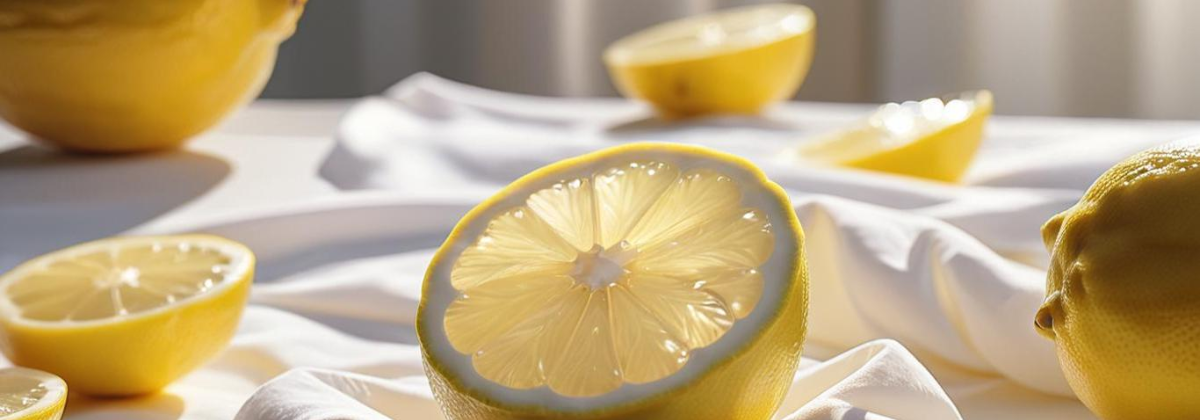30 Mar Lemon Juice in Laundry: Brighten, Freshen, and Remove Stains
When life gives you lemons, you might not immediately think of laundry. However, lemon juice can be a surprisingly effective and natural addition to your laundry routine, offering benefits such as brightening whites, removing stains, and imparting a fresh scent to your clothes. Let’s delve into how lemon juice can revolutionize your laundry game.
Benefits of Using Lemon Juice in Laundry
Lemon juice offers many benefits when incorporated into your laundry routine, making it a versatile and cost-effective solution for maintaining clean and fresh-smelling clothes. Let’s explore some of the key advantages:
- Brightens Whites: Lemon juice serves as a natural bleaching agent, helping to restore the brightness of white fabrics without resorting to harsh chemical bleach. Its acidic properties work to break down stains and discolouration, leaving your whites looking crisp and revitalised.
- Removes Stains: Lemon juice’s citric acid is highly effective at breaking down various types of stains, including those from food, grease, and grass. Pre-treating stains with lemon juice before washing can significantly enhance the stain-removal process, resulting in cleaner garments.
- Freshens Clothes: Besides its stain-fighting abilities, lemon juice imparts a refreshing citrus scent to laundered items, eliminating odours and leaving behind a natural fragrance. Say goodbye to artificial fabric softeners and hello to the invigorating aroma of lemon-infused linens.
- Eco-Friendly Alternative: Unlike commercial laundry products laden with synthetic chemicals, lemon juice offers an environmentally friendly alternative. Its biodegradable nature means it breaks down naturally without harming the environment, making it an eco-conscious choice for laundry care.
- Economical Solution: Lemon juice is readily available and relatively inexpensive compared to specialised laundry products. By incorporating lemon juice into your laundry routine, you can achieve excellent results without breaking the bank, saving money in the long run.
- Versatility: Beyond its primary role as a stain remover and fabric freshener, lemon juice can also be used for other household cleaning tasks. Its natural cleaning properties make it a versatile addition to any home, from cleaning kitchen surfaces to refreshing cutting boards.
How to Use Lemon Juice in Laundry
Incorporating lemon juice into your laundry routine is simple and effective. It offers a natural and eco-friendly alternative to conventional cleaning products. Here’s how you can harness the power of lemon juice to achieve cleaner, fresher-smelling clothes:
- Pre-treating Stains: For stubborn stains, apply undiluted lemon juice directly to the affected area of the fabric. Allow the lemon juice to penetrate the stain for 15-30 minutes before laundering as usual. The acidic properties of lemon juice work to break down the stain. It makes it easier to remove during the wash cycle.
- Adding to Laundry Detergent: To boost the cleaning power of your laundry detergent, add a splash of lemon juice to the wash cycle. This can be particularly effective for brightening whites and revitalising dingy fabrics. Pour a small amount of lemon juice into the detergent dispenser or directly into the drum of the washing machine before starting the cycle.
- Natural Fabric Softener: Instead of using commercial fabric softeners laden with chemicals, consider lemon juice as a natural alternative. Add half a cup of lemon juice to the rinse cycle to help soften fabrics and reduce static cling. Not only does this leave your clothes feeling soft and comfortable, but it also imparts a fresh citrus scent to your laundry.
- Sunlight Activation: To maximise the bleaching effect of lemon juice, allow garments to dry in direct sunlight after treatment. Combining lemon juice and sunlight can work wonders for brightening whites and removing stains. Hang freshly washed items outdoors on a clothesline or drying rack. Ensure they are exposed to direct sunlight for optimal results.
Tips for Using Lemon Juice Effectively
Lemon juice is a versatile and natural ingredient that can enhance the effectiveness of your laundry routine. Here are some handy tips to help you make the most of its cleaning power:
- Testing for Colourfastness: Before using lemon juice on coloured fabrics, it’s essential to perform a colourfastness test to ensure that the lemon juice won’t cause fading or discolouration. Apply a small amount of lemon juice to an inconspicuous area of the fabric. Then, wait 10-15 minutes to see if any adverse reactions occur. Using lemon juice on the garment is safe if the colour remains unchanged.
- Mixing with Other Ingredients: Consider combining lemon juice with natural ingredients, such as baking soda or vinegar for enhanced stain-fighting power. These combinations can create robust cleaning solutions that tackle even the toughest stains. For example, mixing lemon juice with baking soda forms a paste that can be applied to stubborn stains before laundering.
- Sunlight Activation: To maximise the bleaching effect of lemon juice, allow garments to dry in direct sunlight after treatment. Combining lemon juice and sunlight can work wonders for brightening whites and removing stains. Hang freshly washed items outdoors on a clothesline or drying rack; ensuring they are exposed to direct sunlight for optimal results. This natural bleaching method is particularly effective for white fabrics.
Precautions and Considerations
While lemon juice can be a valuable addition to your laundry arsenal, it’s essential to exercise caution and consider the following precautions:
- Avoid Delicate Fabrics: While lemon juice is safe for many fabrics, it’s best to avoid using it on delicate or sensitive materials such as silk or wool. The acidic nature of lemon juice can potentially damage these fabrics, leading to discolouration or weakening of the fibres. Exercise caution and opt for gentler cleaning methods for delicate items.
- Potential Bleaching Effects: Due to its bleaching properties, lemon juice can cause lightening or fading on certain fabrics, particularly when exposed to sunlight. Before using lemon juice on coloured fabrics, perform a colourfastness test to ensure it won’t cause unwanted discolouration. Additionally, avoid using lemon juice in dark or vibrant colours, as it may cause noticeable fading over time.
- Allergy Concerns: Some individuals may be allergic to citrus fruits, including lemons. Exercise caution if you or anyone in your household has a known citrus allergy. Avoid prolonged skin contact with lemon juice and rinse thoroughly if it comes into contact with the skin. If any adverse reactions occur, discontinue use immediately and seek medical advice if necessary.
The Last Word
Incorporating lemon juice into your laundry routine offers many benefits; from brightening whites and removing stains to imparting a fresh citrus scent to your clothes. Its natural cleaning properties make it an effective alternative to harsh chemicals, while its eco-friendly nature ensures minimal environmental impact.
By following simple tips and precautions, you can harness the power of lemon juice to achieve cleaner, fresher-smelling laundry. Whether you’re pre-treating stains, boosting your laundry detergent, or softening fabrics, lemon juice proves to be a versatile and cost-effective solution for all your laundry needs.
So, the next time you do your laundry, consider reaching for a bottle of lemon juice and experience its transformative effects on your clothes. Cleaner, brighter, and fresher-smelling laundry is just a squeeze away with the power of lemon juice.




Sorry, the comment form is closed at this time.